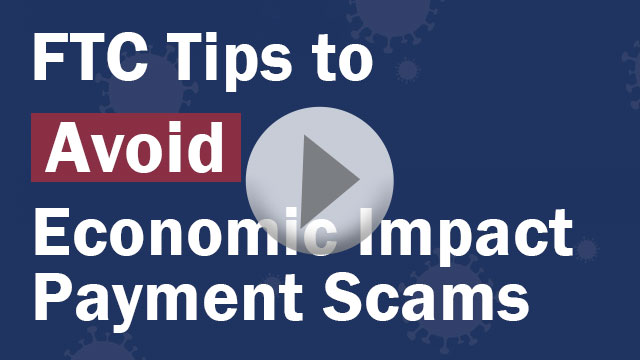
We know there’s been a flood of information and updates about the government’s economic impact payments, or so-called stimulus checks, lately. But quickly and safely moving massive amounts of money into the hands of those who need it is a big job with a lot of moving parts.
We also know that the more you know about the process, the less likely you’re going to be tripped up by calls, text messages, or emails from scammers trying to steal your money or personal information.
Here’s what you need to know about the stimulus payments and how to avoid scams related to these payments.
Who will get money?
Adult U.S. residents that meet established income limits are eligible to receive money from the government. This includes:
Taxpayers – people who filed a federal tax return for 2018 or 2019.
Retirees – people who get Social Security, Railroad, or other retirement benefits.
Beneficiaries – people who get public benefits like SSDI, disability, or veterans’ benefits.
Non-filers – people who do not have to file a federal tax return, including people who made no income or made less than $12,200 (or $24,400 for married couples).
What to do
Most people don’t have to do anything to get their money because the IRS will use the same payment method – direct deposit, Direct Express debit card, or paper check – used to send you your tax refund, Social Security, retirement, or other government benefits money. If the IRS doesn’t have your direct deposit information, you can go to the “Get My Payment” feature at irs.gov/coronavirus and let them know where to send your direct deposit.
If you don’t usually file a tax return, go to irs.gov/coronavirus to access the “Non-filer” portal and to figure out what, if anything, you have to do to claim your money.
To check on the status of your payment, you can now use the “Get My Payment” feature at irs.gov/coronavirus.
Avoiding Coronavirus stimulus payment scams
Scammers are using these stimulus payments to try to rip people off. They might try to get you to pay a fee to get your stimulus payment. Or they might try to convince you to give them your Social Security number, bank account, or government benefits debit card account number.
4 tips for avoiding a Coronavirus stimulus payment scam
- Only use irs.gov/coronavirus to submit information to the IRS – and never in response to a call, text, or email.
- The IRS won’t contact you by phone, email, text message, or social media with information about your stimulus payment, or to ask you for your Social Security number, bank account, or government benefits debit card account number. Anyone who does is a scammer phishing for your information.
- You don’t have to pay to get your stimulus money.
- The IRS won’t tell you to deposit your stimulus check then send them money back because they paid you more than they owed you. That’s a fake check scam.
Report scams to the Federal Trade Commission at ftc.gov/complaint.
To keep up with the latest scams, sign up for the FTC's consumer alerts.
Watch these videos for more tips on how to avoid ecomonic impact payment scams:
(This post is part of the FTC's imposter scam series.)
Updated April 21, 2020 with new deadline for some benefit recipients.


In reply to I had the same problem and it by Clar
In reply to I had the same problem and it by Clar
In reply to Thank you for all the by Bawana1967
In reply to I am a non filer and put my by goldenticket
In reply to I am a non filer and put my by goldenticket
In reply to I filed on the non filer site by Widowtoavet
In reply to Thank you for all the by Bawana1967
In reply to I went to get my payment I by Davis92266
In reply to Got the same status. Says I'm by BuffyB72
In reply to My stimulus went to an by Belle39
Please check the IRS questions and answers at irs.gov/coronavirus/economic-impact-payment-information-center. There are questions and answers about getting your check.
In reply to Please check the IRS by FTC Staff
In reply to Please check the IRS by FTC Staff
In reply to Please check the IRS by FTC Staff
In reply to My stimulus went to an by Belle39
In reply to My stimulus went to an by Belle39
In reply to It happens to me too.. they by Bubblegum 2020
In reply to I've been on the irs website by atkinsgina43
Please check the IRS questions and answers at irs.gov/coronavirus/economic-impact-payment-information-center.
That page says you aren't required to file a tax return and will automatically receive a $1,200 Payment if you received Social Security retirement, SSDI, or survivors benefits. You do not need to contact the IRS or Social Security Administration (SSA). The IRS will use the information from your 2019 benefits to generate a Payment to you if you did not file tax returns in 2018 or 2019. You will receive your Payment as a direct deposit or by mail, just as you would normally receive your federal benefits.
In reply to Please check the IRS by FTC Staff
In reply to Please check the IRS by FTC Staff
In reply to Please check the IRS by FTC Staff
In reply to WHAT if the taxpayer filed by Alysia T. Carney
Please check the IRS questions and answers at irs.gov/coronavirus/economic-impact-payment-information-center and other IRS information.
In reply to Please check the IRS by FTC Staff
In reply to Why is there not a straight by V.L.E
In reply to Why is there not a straight by V.L.E
In reply to Replying to V.L.E : I'm in by E.A.P.
On April 20, the Social Security Administration said if you get Social Security retirement, survivors, or disability benefits, or Supplemental Security Income (SSI), you don't need to take any action with the IRS.
Social Security said "You will automatically get your $1,200 economic impact payment directly from the IRS. You should receive the automatic payments by direct deposit, Direct Express debit card, or by paper check, just as you would normally receive your Social Security benefits."
In reply to On April 20, the Social by FTC Staff
In reply to Then why have I not got a by Gramma
In reply to Replying to V.L.E : I'm in by E.A.P.
In reply to I just went on "get my by Don't sandypus…
In reply to Replying to V.L.E : I'm in by E.A.P.
In reply to Replying to V.L.E : I'm in by E.A.P.
In reply to Why is there not a straight by V.L.E
In reply to some one filed a fraudulent by Alex
Report the identity theft and fill out the IRS Identity Theft Affidavit at www.IdentityTheft.gov. The Affidavit will go to the IRS.
The website will help you create a recovery plan. It has sample letters you can send to businesses and credit reporting agencies to fix problems.
Then, do more to protect yourself:
In reply to You can report identity theft by FTC Staff
In reply to some one filed a fraudulent by Alex
In reply to I filled out info for non by NBell3214
In reply to I filled out info for non by NBell3214
In reply to I filled out info for non by NBell3214
Pagination